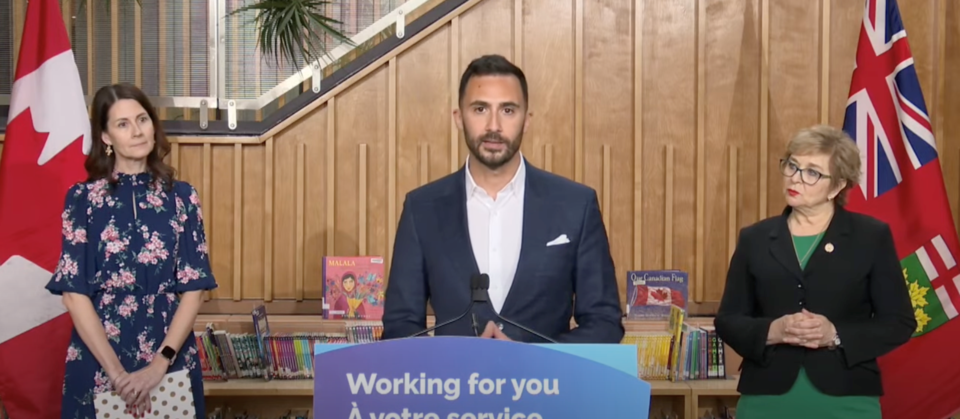EDITOR’S NOTE: A version of this article originally appeared on The Trillium, a Village Media website devoted to covering provincial politics at Queen’s Park.
The Ontario government plans to roll out a new kindergarten curriculum next year that will include new mandatory learning in reading, writing and math.
Education Minister Stephen Lecce announced Tuesday that the updated curriculum would still involve play-based learning, but also include mandatory learning on sound-letter relationships, phonics and "using specific vocabulary."
"For example, to help kids build their vocabulary, the teacher may introduce new words while the children are constructing a house or building blocks," said Lecce, adding that to develop math skills, students would learn about fractions, coding and patterns.
"Students might share shapes or objects among their classmates to understand fractions," he said.
The Ford government said its revamp of the kindergarten curriculum was a continuation of its focus on "back-to-basics learning" and stemmed from the Ontario Human Rights Commission’s (OHRC) Right to Read Report.
The OHRC concluded after its inquiry that "too many Ontario students are not learning to read well" and that there was "an urgent need" to improve this and other learning outcomes, particularly for students with special education needs or learning disabilities, along with racialized, Black and Indigenous students.
"In the Ontario Human Rights Commission report they set out a problem that in our kindergarten program, we do not have those connections, links to literacy and math as updated in the new Grade 1 to 8 curriculum, they recommend an overhaul where we have more explicit daily knowledge and learning with respect to reading and math," said Lecce.
He said he thinks the new curriculum would still "ensure kids remain kids."
"We're going to maintain that play-based model that is so important for discovery and inquiry and allowing kids to continue building those social developmental skills, but we're going to pair it with some explicit expectations for educators around reading, writing and math," he said.
Kate Winn, a kindergarten teacher with the Peterborough Victoria Northumberland and Clarington Catholic District School Board, agreed, saying said her school board has already started to implement the recommendations from the OHRC's report in kindergarten, but that others were "hesitant awaiting official direction."
"I am also pleased that some of the strong qualities of our existing kindergarten program such as honouring play will remain unchanged," said Winn, who spoke at the government's announcement. "Explicit instruction and play are both essential for children and will complement each other as we move forward."
She said she believes the students in her classroom, which incorporates play and "explicit instruction," are "thriving."
"I don't think there's any danger that we're not letting them be kids, I think we're just trying to enhance that educational experience at school," she said.
Winn said kindergarten classrooms have generally used a "balanced literacy approach," which she said was problematic because it involved teaching kids to read "without actually using the words — a lot of follow the pattern in a book and then guess the word or look at a picture to guess the word."
She hopes the new curriculum would involve a different style with "more of that explicit and direct phonics instruction as part of it."
The minister said the government would spend the next year or more consulting with experts in and out of the classroom to develop the new curriculum and then provide professional development "to build the capacity of our kindergarten educators in the classroom."
Lecce said the government would invest $65 million over the next two years for up to 700 specialized early reading teachers to support students in kindergarten to Grade 3 in an individual or group setting.
The teachers wouldn't be placed in all kindergarten classrooms, said Lecce, but rather would be deployed to boards, which would then determine where the educators are needed most.
Starting this school year, the province will also allocate $2.5 million each year to screen students in their second year of kindergarten to Grade 2 on their reading skills.
"It allows us to set out a baseline to benchmark a success and to make sure there's support for those kids that may need more help," Lecce said.
The Elementary Teachers' Federation of Ontario said in a social media post that it hoped the government would "ensure there is adequate time to learn the new curriculum and there are supports to guide ... planning and instructional practice."
